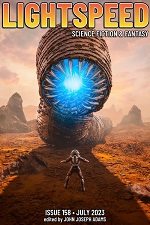“Six Months After All Life on Titan Died” by J.B. Park
“Monsters of the Drunken Shore” by Nic Anstett
“Death Is Better” by Oluwatomiwa Ajeigbe
“Starpoop” by Sandra McDonald
“The Bodhi Tree Asks Only For The Safe Return of Her Beloved“ by Ashok K. Banker
“The Real Worlds” by Lauren Bajek
“The United Systems Goodwill Concert Series And The Greatest Performance Of All Time” by James Van Pelt
“Muna In Barish” by Isha Karki
Reviewed by Mina
In “Six Months After All Life on Titan Died” by J.B. Park, the author turns prompting ChatGPT into a story. They posit a soldier trying to leak what really happened to social media. She is chased and we follow her as she escapes death time and again, killing those sent to exterminate her. It’s a clever plot device but difficult to engage with emotionally, which may well be the whole point.
“Monsters of the Drunken Shore” by Nic Anstett takes teenage angst and runs with it. A drunken teen may or may not have spotted a monster reminiscent of Godzilla in the sea at the dead of night. The monster could simply be the personification of pain at loss of innocence. A melancholic and reflective read.
“Death Is Better” by Oluwatomiwa Ajeigbe weaves robots and slavery together. Kweku and his sister, Abiola, are attempting to escape a plantation on another world that is guarded by armed bots, including a behemoth. They are willing to risk their lives because death is better than slavery. In the chaos they unleash, it is unclear whether they manage to escape or simply find freedom in death. A nice detail in this tale—how albinism can ostracise you in a dark-skinned society.
“Starpoop” by Sandra McDonald jumps all over the place. It reflects the jumble inside the narrator’s mind. Bit by bit, we piece together the story of a son, dead from an overdose; a toddler grandchild, whose presence on social media has become their main source of income; the SF shows they watch and a world devastated by Flu22. We realise that the narrator has a form of dementia, perhaps a long-term side-effects of Flu22. And we see the love of a husband who accepts the narrator’s confusion as a normal part of life: we are in this together, he says simply. Bitter-sweet and real.
“The Bodhi Tree Asks Only For The Safe Return of Her Beloved” by Ashok K. Banker is written entirely in the tree’s voice. We hear only one side of a negotiation for peace, that of the sentient quantum tree asking for the return of their beloved from the human ambassador, Parmendra. Only when this singular demand is met will the Bodhi tree cease its war against humanity. This narrative device skirts being irritating at times but that it does not discourage the reader shows the author’s skill. There is a gentle humour that keeps the reader going as we discover who the beloved is and what happened to her. Worth reading if only for the Waspians.
“The Real Worlds” by Lauren Bajek imagines a family outing in spacetime between realities. Like normal families, the parents squabble and forget to keep an eye on their daughter. Amelia is missing a settled home life, her friends and her dog. She creates a dog out of spacetime but an errant wag of its tail causes the demise of many possible worlds. Amelia is horrified but her mistake cannot be undone. It is a simple but well-written short story. My favourite bit was her father’s job title: “a research anarchist, studying the most effective way to transition hierarchal societies into equitable anti-hierarchical ones.”
“The United Systems Goodwill Concert Series And The Greatest Performance Of All Time” by James Van Pelt takes charity concerts after a disaster at planetary level and marries them to interstellar rock and roll bands playing simultaneously on several different planets. It tells us what happened at Hinged Metal’s concert on Fomalhaut E, where audience participation takes on a whole new meaning. A light, tongue-in-cheek tale.
“Muna In Barish” by Isha Karki is by far the best tale of this issue. We follow Muna of the Nehiri minority (she has horns and dark umber skin, and legend has it her people once had wings) as she survives in the city of Barish. She has found work and apparent shelter in a bookshop, working for Arethor. But as we witness her working days, we realise that Arethor uses apparent kindness to exploit and bully Muna; behaviour that Muna cannot acknowledge even to herself or she will be left unemployed and homeless. Muna wants to be a word-weaver, just like Lenore Phoenix who has a bestselling series about a Halfborn like her. Her secret joy is her correspondence with her hero.
One day, she meets Karabel of the Senai minority (with pointed ears and keen hearing). And she finds friendship, warmth, understanding, companionship and an equal: “Karabel saw her, treated her like someone whose thoughts and actions and beliefs had worth.” She eventually learns that Karabel is Lenore’s downtrodden ghostwriter and responsible for the book series and correspondence that have sustained her through the worst. And Karabel has a plan for their future.
It is a beautifully written story by a word-weaver who plays expertly with intertextuality. And it is a hymn to friendship and finding a sense of community.
Mina had some fun this month writing some flash fiction: Hitch and Anyow.
 Lightspeed
Lightspeed